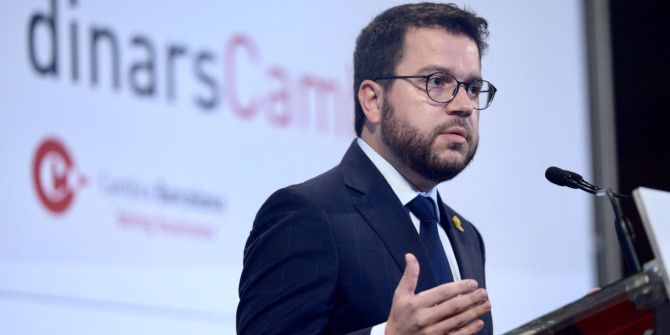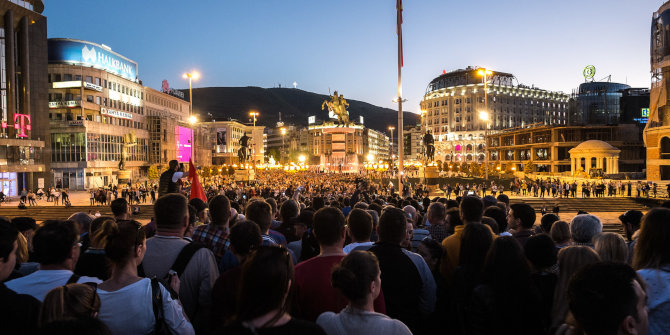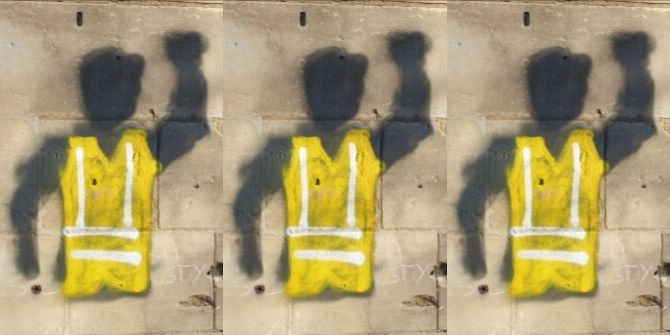On 14 February, Catalonia held regional elections, with pro-independence parties maintaining their majority in the Catalan parliament. Jonathan Parker assesses what the results mean for politics in Catalonia.
The 2021 regional elections in Catalonia saw dramatic shifts between some parties, but confirmed the basic division of Catalan politics into two polarised blocs based on the independence question. While the election offers no clear route out of the region’s impasse, the success of moderates in both camps means that the stalled dialogue process between the Spanish and Catalan governments can continue.
Since the failure of Catalonia’s bid for independence in 2017, there has been increasing divergence between the two largest pro-independence parties. The left leaning Republican Left of Catalonia (ERC), which was the historic torch bearer for Catalan independence, has sought to pursue a strategy of dialogue with the Spanish government, something assisted by the fact the centre-right People’s Party (PP) has been replaced at the national level by Pedro Sánchez and the social democratic PSOE, who are far more receptive to such negotiations.
However, the ERC’s coalition partner (and until this election the larger of the two), Together for Catalonia (Junts), has maintained a hard-line unilateralist stance and continued to call for ‘peaceful confrontation’ with Madrid. The ERC, meanwhile, has provided parliamentary support for the PSOE at the national level, and relations between the ERC and Junts have increasingly soured, to the point that the idea of early elections began to be floated last spring. The push for new elections was derailed temporarily by the Covid-19 pandemic and in the meantime relations hit rock bottom as the ERC was seen by Junts as acquiescing in the removal by Spanish courts of Catalan president Quim Torra. This also meant that the ERC’s Pere Aragonès became acting president.

Pere Aragonès, Credit: Press Cambrabcn (CC BY-SA 2.0)
Despite the infighting, the pro-independence bloc retained its absolute parliamentary majority in this election, and in a significant and unprecedented development obtained a majority of votes cast. This achievement was undermined, however, by the very low turnout, declining from 79 per cent in 2017 to only 51 per cent in this election. This has been largely attributed to the pandemic, although participation fell much more severely in areas where unionist parties usually do better, potentially helping pro-independence parties achieve their historic result.
As usual, there were strong geographic disparities in the support for the secessionist parties, with the four largest pro-independence forces receiving only around 47 per cent of the vote in the Barcelona constituency, but close to 67 per cent in Lleida and Girona. In the Comarca of Barcelona, they were down to only 43 per cent. This reflects longstanding patterns in Catalan electoral history: the Catalan Socialists (PSC) and other left parties have traditionally been dominant in Barcelona and its environs, where immigrants from other areas of Spain (particularly Andalusia) and their descendants are concentrated. The independence parties also performed poorly in the 2021 election in Val d’Aran, a small region in north-western Catalonia which has an Occitan rather than Catalan identity.
Most movement in the 2021 election occurred within each of the two blocs that now characterise Catalan politics. In the pro-independence bloc, there was a narrow victory for the ERC over Junts. The unionist camp saw a more dramatic realignment, with the PSC increasing its vote share by 9.1 percentage points and gaining an extra 16 seats. The PSC is now the largest unionist party and also the largest party overall in terms of votes (though it is tied with the ERC as the largest parliamentary party).
The Catalan Socialists’ remarkable revival is largely attributable to their decision to field Salvador Illa – the Spanish health minister who has fronted much of the country’s Covid-19 response – as their presidential candidate. The impact of Illa’s candidacy, dubbed the ‘Illa effect’ during the campaign, saw the PSC draw level with the ERC and Junts, effectively turning the election into a three-way contest. Much of the party’s new support seems to have come from the liberal and strongly pro-unionist Citizens (Cs), the largest party going into the election, which lost nearly 20 percent of its vote share and 30 seats. This was merely the latest in a series of catastrophic electoral results for Cs and was particularly humbling given the party was founded in Catalonia.
A significant share of those who backed Cs in 2017 seem to have also migrated to the Spanish far-right unionist party Vox, which entered the Catalan parliament for the first time with 7.7 per cent of the vote and 11 seats. Although both parties are usually identified with very different party families, they share common themes with regards to Spanish unionism, centralism and to a certain extent nationalism as well. The collapse of Cs has also been blamed on the party’s inconsistent positioning in Spanish politics over the last few years, as well as the departure of popular Catalan leader Inés Arrimadas to the national leadership.
Given the polarisation between the two blocs, and the remaining pro-independence majority, it is unlikely that any government formation beyond another pro-independence administration can be formed. A realignment of the ERC towards working with the PSC and the leftist En Comú Podem (ECP) was talked up during the early stages of the campaign as a possibility, but the ERC eventually signed a pledge not to work with the Socialists. The ERC now seems to be seeking to broaden the government to include the ECP as well as Junts and the smaller, more leftist, pro-independence Popular Unity Candidacy (CUP), which also had a very good election. Regardless of which parties end up joining or supporting the new government, it will likely continue to be led by Pere Aragonès, with the ERC having confirmed its status as the most pivotal party in the Catalan party system.
Note: This article gives the views of the author, not the position of EUROPP – European Politics and Policy or the London School of Economics. Featured image credit: Press Cambrabcn (CC BY-SA 2.0)





In underpopulated Provinces ( Lérida & Gerona for example) votes are worth 3 times those of Barcelona – the main obstacles to the true picture of Catalan politics are: the Electoral Law/ Abstention & that one and a half million Foreigners ( who may have lived in Catalonia for decades) cannot vote. In short, the Separatists represent the minority.
this article neglects the fact that votes outside Barcelona, Tarragona and Lleida have more weight thus in a way falsifying the election results